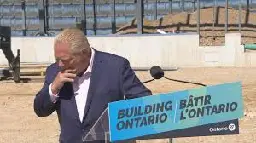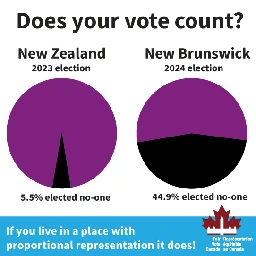>YOU can provide your feedback and shape decisions that impact you! This initiative is all about making sure the RCMP better reflects the needs of Canadian communities while boosting trust and transparency.
An example, which I am not advocating for, is lowering the number of regional seats, and converting them into party list seats. This way, the number of seats remains the same.
And Pharmacare, and dental care. These are just some examples of what government can deliver when we have a representative democracy, as guaranteed under PR.
Technically, MMP does not at all require a change in the number of seats.
The doubling of seats is only used to aid in explanation.

YouTube Video
Click to view this content.
cross-posted from: https://lemmy.ca/post/31690333
>Canada, the US and the UK all suffer the consequences of winner-take-all voting systems that distort election results, polarize politics and shut voters out. > >In this webinar, leading experts and campaigners for proportional representation from Canada, the US, and the UK, discuss the issues each country has with their winner-take-all elections, how transitioning to proportional representation can help address these issues, and what the routes to reform in each country look like. > >Co-sponsored by: > >Fair Vote Canada: https://www.fairvote.ca/ >ProRep Coalition (California): https://www.prorepcoalition.org/ >Make Votes Matter (UK): https://makevotesmatter.org.uk/

YouTube Video
Click to view this content.
>Canada, the US and the UK all suffer the consequences of winner-take-all voting systems that distort election results, polarize politics and shut voters out. > >In this webinar, leading experts and campaigners for proportional representation from Canada, the US, and the UK, discuss the issues each country has with their winner-take-all elections, how transitioning to proportional representation can help address these issues, and what the routes to reform in each country look like. > >Co-sponsored by: > >Fair Vote Canada: https://www.fairvote.ca/ >ProRep Coalition (California): https://www.prorepcoalition.org/ >Make Votes Matter (UK): https://makevotesmatter.org.uk/
Global News recently reported that the Progressive Conservative Party will begin nominating candidates this month, the latest sign that Premier Doug Ford is considering a snap vote. In 2022, the PCs formed a second “false majority” government after winning just … Read More

cross-posted from: https://lemmy.ca/post/31690088
>Global News recently reported that the Progressive Conservative Party will begin nominating candidates this month, the latest sign that Premier Doug Ford is considering a snap vote. > >In 2022, the PCs formed a second “false majority” government after winning just 41% of the vote. Given that progressive parties—the OLP, ONDP, and GPO—received a combined 54% of the vote, it seems Ontario’s democratic majority was once again denied its right to govern. > >What made the situation even more dire, however, was the historically low voter turnout of 43%, which meant Ford was handed a majority government by a meagre 18% of eligible voters. These results spell a crisis of legitimacy for our democracy, especially when it comes to the legislation passed by such a government. > >For instance, in 2019, the PCs passed Bill 124, which capped salary increases for broader public sector workers (including teachers and nurses) to 1% per year for three years. It was later deemed unconstitutional by the Ontario Court of Appeal, which ruled that it violated the Charter of Rights and Freedoms with respect to unionized employees. > >Here is a list of other legislation passed by the PCs that might not have come into force under PR: > >1. Bill 60: Your Health Act (May 2023) allowed private clinics to conduct more OHIP-covered surgeries despite critics warning that it would lead to a two-tiered system. At the time, the NDP said it presented 74 amendments to the Your Health Act to the committee, but none were accepted or even considered by the PCs. >2. Bill 3: Strong Mayors, Building Homes Act (Sept 22) gave mayors more power by allowing them a veto on bylaws passed by council, the ability to hire and dismiss senior managers, and stewardship over the city budget. While municipal powers are determined by the provincial government, the bill is widely seen as a continuation of the erosion of municipal powers and councillors, who are elected by citizens to exercise their democratic will. >3. Bill 39: Better Municipal Governance Act (2023) extended “strong mayor” powers to other municipalities. Opposition parties were critical of how it allowed mayors to pass certain bylaws with just one-third of council support. >4. Bill 23: More Homes Built Faster Act (2022) reduced development fees (to boost construction) despite significant opposition from environmental groups, municipal governments, and Indigenous communities. >5. Bill 7: More Beds, Better Care Act (2022) allowed hospitals to free up hospital beds by discharging elderly patients to long-term care homes without their consent. The bill faced backlash for infringing on patient rights. > >Finally, while not a legislative bill, the Greenbelt land swap scandal raised significant issues in 2023 when the Ford government came under scrutiny for opening up previously protected Greenbelt land for development against the will of elected municipal councillors. The Auditor General’s report revealed that the process disproportionately favoured certain developers...
Global News recently reported that the Progressive Conservative Party will begin nominating candidates this month, the latest sign that Premier Doug Ford is considering a snap vote. In 2022, the PCs formed a second “false majority” government after winning just … Read More

>Global News recently reported that the Progressive Conservative Party will begin nominating candidates this month, the latest sign that Premier Doug Ford is considering a snap vote. > >In 2022, the PCs formed a second “false majority” government after winning just 41% of the vote. Given that progressive parties—the OLP, ONDP, and GPO—received a combined 54% of the vote, it seems Ontario’s democratic majority was once again denied its right to govern. > >What made the situation even more dire, however, was the historically low voter turnout of 43%, which meant Ford was handed a majority government by a meagre 18% of eligible voters. These results spell a crisis of legitimacy for our democracy, especially when it comes to the legislation passed by such a government. > >For instance, in 2019, the PCs passed Bill 124, which capped salary increases for broader public sector workers (including teachers and nurses) to 1% per year for three years. It was later deemed unconstitutional by the Ontario Court of Appeal, which ruled that it violated the Charter of Rights and Freedoms with respect to unionized employees. > >Here is a list of other legislation passed by the PCs that might not have come into force under PR: > >1. Bill 60: Your Health Act (May 2023) allowed private clinics to conduct more OHIP-covered surgeries despite critics warning that it would lead to a two-tiered system. At the time, the NDP said it presented 74 amendments to the Your Health Act to the committee, but none were accepted or even considered by the PCs. >2. Bill 3: Strong Mayors, Building Homes Act (Sept 22) gave mayors more power by allowing them a veto on bylaws passed by council, the ability to hire and dismiss senior managers, and stewardship over the city budget. While municipal powers are determined by the provincial government, the bill is widely seen as a continuation of the erosion of municipal powers and councillors, who are elected by citizens to exercise their democratic will. >3. Bill 39: Better Municipal Governance Act (2023) extended “strong mayor” powers to other municipalities. Opposition parties were critical of how it allowed mayors to pass certain bylaws with just one-third of council support. >4. Bill 23: More Homes Built Faster Act (2022) reduced development fees (to boost construction) despite significant opposition from environmental groups, municipal governments, and Indigenous communities. >5. Bill 7: More Beds, Better Care Act (2022) allowed hospitals to free up hospital beds by discharging elderly patients to long-term care homes without their consent. The bill faced backlash for infringing on patient rights. > >Finally, while not a legislative bill, the Greenbelt land swap scandal raised significant issues in 2023 when the Ford government came under scrutiny for opening up previously protected Greenbelt land for development against the will of elected municipal councillors. The Auditor General’s report revealed that the process disproportionately favoured certain developers...
So what's your point? That apathy means that we should not improve our democracy?
- In 2005, BC held a referendum with 57.69% in favour of a PR electoral system known as Single Transferable Vote (STV). No change whatsoever occurred.
- For electoral reform, referendums aren't appropriate anyway.
- I do think BC can "cry" about the continued harms of FPP. FPP is mathematically inferior to PR, so the problem is multi factored: a) referendums are an inappropriate tool for electoral reform, b) disinformation campaigns and fearmongering have dissuaded citizens.
This wouldn't be a concern under proportional representation (PR). And let's get PR without this nonsense of a referendum.
Join the discussion over at !fairvote@lemmy.ca.
Technically, yes, instant-runoff voting (IRV) is better than FPP. However, neither are considered proportional representation (PR).
- In 2024, Fair Vote Canada sent out "almost 60,000 emails to members and supporters" [Steve Hindle, FVC co-chair].
- This isn't to say a data breach is acceptable, but Fair Vote Canada is mostly volunteer run.
The New Brunswick election saw the Liberal Party form a majority with 48.2% of the vote. The Green Party got 13.8% of the vote but only two seats.

cross-posted from: https://lemmy.ca/post/31487544
> Only 48.2% of New Brunswick voters supported the New Brunswick Liberals, yet the voting system has handed Susan Holt’s Liberals 63.3% of the seats and 100% of the power. > > The election results were a misrepresentation of what voters said with their ballots: > - The Liberals got 63.3% of the seats with 48.2% of the vote. > - The Progressive Conservatives got 32.7% of the seats with 35.0% of the vote. > - The Greens got only 4.1% of the seats with 13.8% of the votes, electing only 2 MLAs to represent their 51,523 voters. > - About 44.9% of voters – 168,429 – cast wasted votes that elected no-one. > > With proportional representation, where the seats in the New Brunswick legislature matched the popular vote, no single party would have had all the power and parties would have had to work together in the legislature. > > First-past-the-post makes New Brunswick appear more divided along linguistic lines than it actually is. The 16 PC seats are all in the English-speaking ridings, so the Liberal victory is in the francophone ridings plus six in Saint John and three in Fredericton. With proportional representation, all three parties will have elected MLAs in all areas of the province. > > “Once again, our voting system has distorted the will of the people,” said Vivian Unger, from Fair Vote New Brunswick. This time, it gave the Liberals a majority with 48.2% of the vote. I congratulate the Liberals on their win, but I’d also like to remind them of that time in 2018 that they got the most votes but lost the election. This time, they were running against a very unpopular Premier, and that helped them out. That’s not something they can count on in the future. I hope this win will not prevent them from holding that citizens’ assembly on electoral reform, ASAP. Their members voted for it.” > > The New Brunswick Greens put proportional representation in their election platform. For the sake of all New Brunswick voters, it’s time for the New Brunswick Liberals to put proportional representation on their agenda.
The New Brunswick election saw the Liberal Party form a majority with 48.2% of the vote. The Green Party got 13.8% of the vote but only two seats.

> Only 48.2% of New Brunswick voters supported the New Brunswick Liberals, yet the voting system has handed Susan Holt’s Liberals 63.3% of the seats and 100% of the power. > > The election results were a misrepresentation of what voters said with their ballots: > - The Liberals got 63.3% of the seats with 48.2% of the vote. > - The Progressive Conservatives got 32.7% of the seats with 35.0% of the vote. > - The Greens got only 4.1% of the seats with 13.8% of the votes, electing only 2 MLAs to represent their 51,523 voters. > - About 44.9% of voters – 168,429 – cast wasted votes that elected no-one. > > With proportional representation, where the seats in the New Brunswick legislature matched the popular vote, no single party would have had all the power and parties would have had to work together in the legislature. > > First-past-the-post makes New Brunswick appear more divided along linguistic lines than it actually is. The 16 PC seats are all in the English-speaking ridings, so the Liberal victory is in the francophone ridings plus six in Saint John and three in Fredericton. With proportional representation, all three parties will have elected MLAs in all areas of the province. > > “Once again, our voting system has distorted the will of the people,” said Vivian Unger, from Fair Vote New Brunswick. This time, it gave the Liberals a majority with 48.2% of the vote. I congratulate the Liberals on their win, but I’d also like to remind them of that time in 2018 that they got the most votes but lost the election. This time, they were running against a very unpopular Premier, and that helped them out. That’s not something they can count on in the future. I hope this win will not prevent them from holding that citizens’ assembly on electoral reform, ASAP. Their members voted for it.” > > The New Brunswick Greens put proportional representation in their election platform. For the sake of all New Brunswick voters, it’s time for the New Brunswick Liberals to put proportional representation on their agenda.
BC's 2024 first-past-the-post election has robbed voters of choice, polarized communities, and when it comes to the biggest issues, resolved nothing.

cross-posted from: https://lemmy.ca/post/31487063
> While British Columbians wait with baited breath for the final results from BC’s provincial election, one thing is clear: First-past-the-post has robbed voters of choice, deeply polarized communities, and when it comes to the biggest issues facing British Columbia, resolved absolutely nothing. > > BC Conservative leader John Rustad’s election night speech captured the sorry state of affairs: > >> “If we are in that situation of the NDP forming a minority government, we will look at every single opportunity from day one to bring them down …and get back to the polls.” > > A leader whose party received 44% of the popular vote vowing to do everything in his power to ensure the legislature doesn’t work for the majority, gunning for the next chance to seize all the power with less than half of the vote, is a brutal, yet predictable outcome of first-past-the-post. > > If the supposed advantages of our winner-take-all system are its ability to cater to the centrist voter, ensure “strong, stable majority governments”, prevent “backroom deals”, deliver fast results on election night, and keep out extremists, it has failed utterly on all counts―all at once. > > BC’s election has exposed these claims for what they are: at best, misleading talking points from those who haven’t reviewed the evidence, and at worst, deliberately dishonest assertions from shallow politicians who consistently put their own ambitions of power ahead of the public interest when it comes to electoral reform...
BC's 2024 first-past-the-post election has robbed voters of choice, polarized communities, and when it comes to the biggest issues, resolved nothing.

cross-posted from: https://lemmy.ca/post/31487063
> While British Columbians wait with baited breath for the final results from BC’s provincial election, one thing is clear: First-past-the-post has robbed voters of choice, deeply polarized communities, and when it comes to the biggest issues facing British Columbia, resolved absolutely nothing. > > BC Conservative leader John Rustad’s election night speech captured the sorry state of affairs: > >> “If we are in that situation of the NDP forming a minority government, we will look at every single opportunity from day one to bring them down …and get back to the polls.” > > A leader whose party received 44% of the popular vote vowing to do everything in his power to ensure the legislature doesn’t work for the majority, gunning for the next chance to seize all the power with less than half of the vote, is a brutal, yet predictable outcome of first-past-the-post. > > If the supposed advantages of our winner-take-all system are its ability to cater to the centrist voter, ensure “strong, stable majority governments”, prevent “backroom deals”, deliver fast results on election night, and keep out extremists, it has failed utterly on all counts―all at once. > > BC’s election has exposed these claims for what they are: at best, misleading talking points from those who haven’t reviewed the evidence, and at worst, deliberately dishonest assertions from shallow politicians who consistently put their own ambitions of power ahead of the public interest when it comes to electoral reform...
BC's 2024 first-past-the-post election has robbed voters of choice, polarized communities, and when it comes to the biggest issues, resolved nothing.

cross-posted from: https://lemmy.ca/post/31487063
> While British Columbians wait with baited breath for the final results from BC’s provincial election, one thing is clear: First-past-the-post has robbed voters of choice, deeply polarized communities, and when it comes to the biggest issues facing British Columbia, resolved absolutely nothing. > > BC Conservative leader John Rustad’s election night speech captured the sorry state of affairs: > >> “If we are in that situation of the NDP forming a minority government, we will look at every single opportunity from day one to bring them down …and get back to the polls.” > > A leader whose party received 44% of the popular vote vowing to do everything in his power to ensure the legislature doesn’t work for the majority, gunning for the next chance to seize all the power with less than half of the vote, is a brutal, yet predictable outcome of first-past-the-post. > > If the supposed advantages of our winner-take-all system are its ability to cater to the centrist voter, ensure “strong, stable majority governments”, prevent “backroom deals”, deliver fast results on election night, and keep out extremists, it has failed utterly on all counts―all at once. > > BC’s election has exposed these claims for what they are: at best, misleading talking points from those who haven’t reviewed the evidence, and at worst, deliberately dishonest assertions from shallow politicians who consistently put their own ambitions of power ahead of the public interest when it comes to electoral reform...
BC's 2024 first-past-the-post election has robbed voters of choice, polarized communities, and when it comes to the biggest issues, resolved nothing.

> While British Columbians wait with baited breath for the final results from BC’s provincial election, one thing is clear: First-past-the-post has robbed voters of choice, deeply polarized communities, and when it comes to the biggest issues facing British Columbia, resolved absolutely nothing. > > BC Conservative leader John Rustad’s election night speech captured the sorry state of affairs: > >> “If we are in that situation of the NDP forming a minority government, we will look at every single opportunity from day one to bring them down …and get back to the polls.” > > A leader whose party received 44% of the popular vote vowing to do everything in his power to ensure the legislature doesn’t work for the majority, gunning for the next chance to seize all the power with less than half of the vote, is a brutal, yet predictable outcome of first-past-the-post. > > If the supposed advantages of our winner-take-all system are its ability to cater to the centrist voter, ensure “strong, stable majority governments”, prevent “backroom deals”, deliver fast results on election night, and keep out extremists, it has failed utterly on all counts―all at once. > > BC’s election has exposed these claims for what they are: at best, misleading talking points from those who haven’t reviewed the evidence, and at worst, deliberately dishonest assertions from shallow politicians who consistently put their own ambitions of power ahead of the public interest when it comes to electoral reform...
This wouldn't be a concern under proportional representation (PR). Join us over at !fairvote@lemmy.ca.
Think of Mixed Member Proportional (MMP), but with only party lists, and no local representatives.
I think I should be included as well for similar reasons. It's also good redundancy to have multiple moderators!
Edit: I also actually volunteer with the Fair Vote Canada regularly.
Somebody needs to just enact PR. I think with the most recent BC election, there's no reason Greens shouldn't attempt to force PR. The Greens should be aggressive and use their balance of power, otherwise they might face extinction under Duverger's law.
I've also thought it might be a good idea if parties work together, not to split the vote. So for BC, Greens could get the island (and not run candidates in the mainland), while NDP for mainland (and not run candidates on the Island). They are more alike than they are different.
I like the general strike idea, but it needs to be coordinated. We've been too conditioned to accept our broken FPP system.
I've also been thinking about PR for civil society for example with the Council of Canadians.
- IRV and STV both use "ranked ballots".
- IRV is not PR, STV is PR.
- Trudeau only wanted IRV, so he kept saying "ranked ballot". However, electoral reform proponents want "every vote to count" just like the LPC campaigned on.
- The House of Commons Special Committee on Electoral Reform (ERRE) recommends PR and does not recommend IRV. Therefore, Trudeau kills electoral reform, claiming a "lack of consensus".
- End of this story, but not the end of PR.
I'd agree with referendums, if they were widely used in other issues. Like, what would the referendum on the Greenbelt look like? What about Ontario Place? What about the sneaking privatization of our public healthcare systems? What about Doug Ford himself?
Referendums for electoral reform are really just a way for the government/establishment to look like they are fulfilling a campaign promise, without actually improving the system. It's worse than virtue signalling, cause after a (failed) referendum, it harms the PR movement. Even though it can be demonstrated that PR is mathematically superior to FPP...
And also, why do we pay our representatives in the first place? It's their job to understand the policies and issues such as proportional representation, then act in the best interests of their constituents. Obviously, ensuring every vote counts, and no group holds disproportionate power is something that improves our democratic institutions, and improving democratic institutions benefits constituents.
Anyway, that's why I keep pushing. PR proponents are holding the torch until that fateful day comes where PR is enacted.
The LPC campaigned on 2015 being the last election under FPP, along with ensuring "every vote counts".
When you say "make every vote count" this necessarily means proportional representation (PR). PR is the only viable long term solution being pushed by electoral reform advocates. Some examples of PR electoral systems:
Trudeau has only ever (secretly) wanted instant runoff voting (IRV) to replace the current first past the post (FPP). So when the tide shifted against him, he broke his election promise and bailed on electoral reform.
In either IRV or FPP, many votes will not count at all (>=50%). So neither IRV nor FPP satisfy the criteria for proportional representation (PR).
Note: lots of people use the term "ranked ballot", but this is inaccurate. Ranked ballot is simply a mechanism, and not an electoral system. For example, both IRV and STV use the ranking mechanism, but only STV is considered PR.
So while Trudeau was pushing for "ranked ballot", along with the "make every vote count" messaging, people are right to infer that STV would be implemented. STV uses ranked ballot but is still considered PR.
So that's 4 electoral systems:
- First-past-the-post (FPP)
- Instant-runoff voting (IRV)
- Mixed member proportional (MMP)
- Single transferable vote (STV)
Only MMP and STV are considered PR!
Join the conversation at !fairvote@lemmy.ca.
The only viable long term solution is proportional representation (PR). Some electoral systems meeting this criteria:
Canada needs to stop believing that PR requires a referendum. The only people pushing a referendum are those with ulterior motives or are misinformed.
- There is no constitutional requirement. For example, in 1924 Alberta substantially changed their electoral system, adopting some PR elements.
- In 2005, BC held a referendum with 57.69% in favour of a PR electoral system known as Single Transferable Vote (STV). No change whatsoever occurred.
- The electoral system has been modified many times without a referendum. For example, per-vote subsidies were removed by Conservatives in 2011 no less, which sparked the famous prorogation of parliament.
- Referendums, no matter how clear the question is, aren't an appropriate tool. Ordinary people just don't have the time to weigh the pros and cons of various electoral systems. Citizen's assemblies would be more appropriate, as this would require comprehensive analysis by ordinary citizens.
- Why would we need a referendum to restore the fundamental rights of voters? The right to vote must necessarily include the right for the vote to have an effect. Literally millions of perfectly valid ballots are simply tossed out every single election. This would be an outrage had we not been conditioned to accept it.
The key to unlocking political parties like these is proportional representation. Some electoral systems meeting this criteria:
>A former vice-president of the Progressive Conservative party has been appointed an Ontario judge — a move opposition parties say is the latest example of the government putting insiders into prestigious roles. > >On Monday, the province announced Sara Mintz was appointed to the Ontario Court of Justice and will be stationed in Toronto.
How is this not part of the "gravy train"?
What if one of these judges were to preside over a potential Greenbelt trial?
Please contact your MPPs about this, especially if your MPP is Conservative!
Nobody is disputing that the wealthy consume more than the poor.
We are disputing your claim that the wealthy do not pay their fair share of greenhouse gas emissions. Please provide evidence to substantiate your claims.
Thank you for this point. This is important to highlight in the age of carbon pricing misinformation.

Saw the Premier's press conference this morning and felt disappointed.
I, on principle, am against donating to political parties. So I decided to take some action by donating to charities (and at the same time sending an eCard to my MPP).
>Hi Mr.Anand, I would like to thank Premier Ford and the Ontario PCs for bringing the carbon tax to Ontario by cancelling the Cap and Trade program in 2018. The carbon tax that was held as constitutional by the Supreme Court of Canada. I am donating to Gen Squeeze (832390199RR0001) and the Greenbelt Foundation (822521878RR0001) as a result of the maligned press conference hosted by the Premier on April 2, 2024. Sincerely, *****, an active constituent from Mississauga-Malton.
On March 26th, 2024, 300+ leading Canadian Economists signed an open letter on carbon pricing. >the most vocal opponents of carbon pricing are not offering alternative policies to reduce emissions and meet our climate goals. And they certainly aren’t offering any alternatives that would reduce emissions at the same low cost as carbon pricing.
